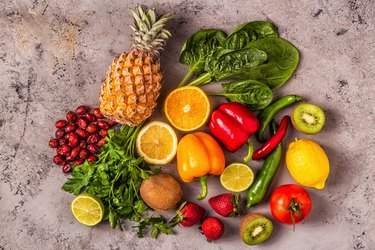
If you have acid reflux, you may wonder if vitamin C-containing foods and supplements can aggravate — or even help — your condition, given that vitamin C itself is acidic. Here are the ABCs on vitamin C and acid reflux.
Video of the Day
Video of the Day
You Can Eat Vitamin C or Take Supplements
Humans cannot make vitamin C (aka ascorbic acid), so it is essential that you get it from your diet, according to the Office of Dietary Supplements (ODS). Vitamin C helps you absorb iron, keep your immune system strong and make key proteins, among other functions.
While taking vitamin C may seem counterintuitive when you have acid reflux, you can get this essential nutrient from buffered supplements — or better yet, fruits and vegetables — and not feel the burn, says Richard I. Rothstein, MD, gastroenterologist, internist and chair of the Department of Medicine at both Dartmouth-Hitchcock Medical Center in Lebanon and Geisel School of Medicine at Dartmouth College in Hanover, New Hampshire.
Vitamin C, as well as vitamin E, may even be beneficial in reducing inflammation and healing tissues irritated by acid reflux, Dr. Rothstein says. Vitamin C "is nowhere near as acidic as what's in the stomach," he says.
Take Vitamin C With Minerals and Liquids
People who wish to take vitamin C supplements may choose calcium ascorbate, sodium ascorbate or other forms that combine the vitamin with minerals, Dr. Rothstein says. He also suggests vitamin C tablets, and most pills, be taken with liquid or food because the saliva generated will buffer acidity.
"Anything that causes you to salivate — such as sucking on hard candies — can be quite helpful," Dr. Rothstein says. "The act of swallowing can clear out what's in the esophagus."
Eating Your Vitamin C
Per the ODS, recommended daily intake varies, but adults should typically aim for 75 to 90 milligrams of vitamin C a day.
If you smoke, or are pregnant or lactating, those values go up a bit.
Dr. Rothstein prefers people get their vitamins from diet — not from supplements.
Vitamin C-rich orange juice with added calcium is easier on the stomach than plain OJ, Dr. Rothstein says. If you use a juicer or blender to make juice from oranges or other fruit, leave the pulp in the juice, as your intestines need the fiber, he says. And adding a banana or yogurt to make a smoothie can help buffer the juice's acidity.
Beyond oranges, many foods are excellent sources of vitamin C. The ODS lists these top choices, among others, with milligrams per serving:
- Red peppers (1/2 cup, 95 mg)
- Grapefruit juice (3/4 cup, 70 mg)
- Kiwis (1 medium, 64 mg)
- Green peppers (1/2 cup, 60 mg)
- Broccoli (1/2 cup cooked, 51 mg; raw, 39 mg)
- Strawberries (1/2 cup, 49 mg)
- Brussels sprouts (1/2 cup, 48 mg)
- Grapefruit (1/2 medium, 39 mg)
A food's acidity is not always to blame for acid reflux, Dr. Rothstein adds. Someone may blame tomatoes for heartburn after eating pizza or spaghetti, but the culprit actually may have been the fat from cheese and meat instead.
Dr. Rothstein recommends keeping a journal of acid reflux symptoms and what you ate so you can better determine which foods bother you.
Understanding and Limiting Acid Reflux
There's a valve-like sphincter between the stomach and the bottom of the esophagus that opens when we swallow — and spontaneously at times — permitting lower esophagus acid exposure for about 40 minutes each day, Dr. Rothstein says.
These openings let burps out, but they can also let some stomach contents into the esophagus, which can cause heartburn.
"Up to 40 percent of the population in the U.S. may have acid reflux on a monthly basis," Dr. Rothstein says. Severe acid reflux that occurs often over an extended period of time is called GERD (gastroesophageal reflux disease), according to the National Institute of Diabetes and Digestive and Kidney Diseases.
You can limit your chances of an acid reflux episode by not eating late at night and avoiding fatty foods, both of which can loosen the lower esophageal sphincter, Dr. Rothstein says. You should also steer clear of chocolate and mint, which can also be triggers.
Read more: The 9 Best Natural Remedies for Heartburn
- Richard I. Rothstein, MD, double board-certified gastroenterologist, internist; chair, Department of Medicine, Dartmouth-Hitchcock Medical Center, Lebanon, New Hampshire; chair, Department of Medicine, professor of medicine and surgery, Geisel School of Medicine, Dartmouth College, Hanover, New Hampshire
- Office of Dietary Supplements: “Vitamin C: Fact Sheet for Health Professionals”
- National Institute of Diabetes and Digestive and Kidney Diseases: “Definition & Facts for GER & GERD”
Is this an emergency? If you are experiencing serious medical symptoms, please see the National Library of Medicine’s list of signs you need emergency medical attention or call 911.